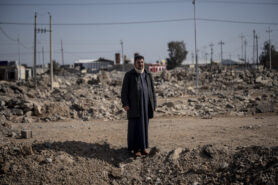Photo by Pax/Ayman al-Amiri, Hawija Iraq, February 2022.
Utrecht University’s Intimacies of Remote Warfare programme (IRW) and their societal partners PAX and Al-Ghad expose the reverberating civilian harm effects of remote warfare in their report ‘After The Strike’. It will be launched on April 13th, 2022, at De Balie in Amsterdam.
Find more info and grab your tickets here.
On the night of 2 June 2015, the US-led Coalition against the Islamic State (IS) bombed a munitions factory in the city of Hawija, Iraq. The airstrike and the secondary explosion it triggered destroyed an entire neighbourhood. Reports soon emerged claiming an estimated 70 civilians had been killed. This attack was just one out of 34.000 attacks carried out by the anti-IS Coalition across Syria and Iraq, described by those involved as ‘the most precise war in history’. Four and a half years later, a joint investigation by Dutch outlets NRC and NOS revealed that the attack in Hawija was in fact launched by Dutch F-16s. This news led to five parliamentary debates questioning the exact number of civilians killed and why the Dutch Ministry of Defense had first denied and then kept them secret from Parliament. The civilian harm effects, however, were not investigated.
In response, Utrecht University’s Intimacies of Remote Warfare programme teamed up with PAX and Iraqi NGO Al-Ghad to conduct research on the direct and reverberating civilian harm effects caused by the strike. Together, they collected open source intelligence and satellite imagery and conducted 119 interviews with civilian victims, and 40 more with key stakeholders in Hawija. Their findings not only highlight the devastating and compounding impact of remote bombing in rebel held urban centres, but also how people give meaning to the harm that was done to them.
Want to learn more about this transdisciplinary research project and its impact on Dutch society? Then join the launch of the report “After the strike: Exposing the civilian harm effects of the 2015 Dutch airstrike on Hawija” on April 13th, 2022, at De Balie in Amsterdam. During the live event, that can also be watched online, the report’s authors, renowned NYT journalist Azmat Khan, documentary maker Danny Ghosen, human rights lawyer Liesbeth Zegveld, Lars Walrave (Dutch Ministry of Defense) and parliamentarians will come together to reflect on the systemic impact of remote warfare on civilian harm, discuss the present needs in Hawija, and debate how to improve democratic control over wars fought in our name.
The entire report will be made publicly available on the Intimacies of Remote Warfare website in the days leading up to the event.
The Intimacies of Remote Warfare is a project of Utrecht University’s Centre for Global Challenges and the Institutions for Open Societies’ Contesting Governance platform.



